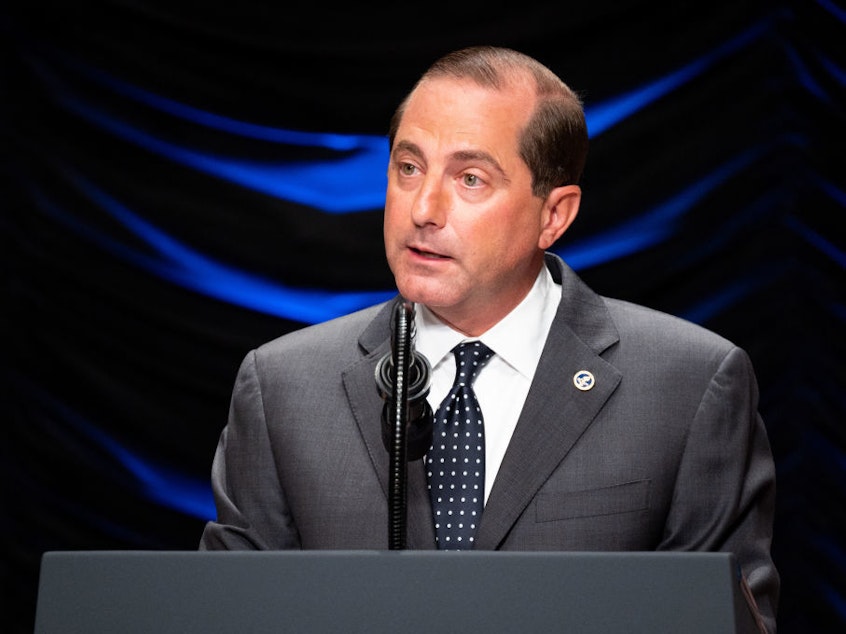As Its Drug Pricing Plans Fall Through, Trump Administration Turns To Congress To Act

The Trump administration has dropped one of the meatiest portions of its plan to reduce drug prices.
The Department of Health and Human Services said it will no longer pursue a rule that would have prohibited the payment of certain rebates on drugs in Medicare Part D and Medicaid plans.
The idea was to target the middlemen, pharmacy benefit managers, whose negotiations with drugmakers and insurers influence the costs consumers pay for drugs.
The hope was the rule would have effectively pressured drugmakers to give discounts to consumers instead of middlemen, HHS secretary Alex Azar said in remarks to the media in February. "Passing discounts directly on to the patient will move us toward a real market for drugs," said Azar. "We're going to fundamentally rewire how we pay for drugs in this system."
Right now, if you're a Medicare Part D beneficiary, and you need to pick up a drug that has a $120 list price, you might have to pay that full price, even if the middleman that negotiates on behalf of your insurer only pays a net price of $100 for it, after rebates. The idea of this proposal was that the consumer would only have to pay the discounted price.
Sponsored
When the rule was first announced, drugmakers supported the idea, and some drug pricing experts said it could be an effective move. "This is a huge potential change, transformative," Dr. Walid Gellad, director of the Center for Pharmaceutical Policy and Prescribing at the University of Pittsburgh told NPR.
But some critics were concerned that the move wouldn't address drugs' list prices that are the starting point for negotiations.
Also, there was a worry that the elimination of rebates could ultimately cost seniors more, in higher premiums on their Medicare plans. The nonpartisan Congressional Budget Office in May determined the plan would cost the federal government $177 billion over nine years, largely from increases in the government's share in the cost of premiums.
In a briefing with reporters Thursday, Azar said the administration scrapped the plan after getting feedback from the public and stakeholders. "At the end of the day, while we support the concept of getting rid of rebates, while we appreciate and are passionate about the problems and the distortions in the system caused by this opaque rebate system, we're not going to put seniors at risk of their premiums going up."
"Congress perhaps might even take this up — they have more tools than we do," Azar said. "They can actually look more holistically at changes to the system that could also mitigate or protect seniors from bearing any impact of change. I don't have those tools; they might have those tools."
Sponsored
A senior Trump administration official, who spoke on background during a separate briefing Thursday, echoed those sentiments, saying their primary focus is to support a legislative deal to lower drug prices and that there was concern this change would disrupt those efforts.
Drugmakers were in favor of trying to bring consumer prices down by targeting middlemen. The drug industry trade group PhRMA called the rollback of the plan "a blow to seniors who could have paid less for their medicines at the pharmacy counter."
"Of all the policies proposed in Washington right now, this was the only proposal that would provide immediate savings at the pharmacy counter, instead of only saving the government or insurance companies money," said Holly Campbell, PhRMA's deputy vice president of public affairs in a statement.
Other stakeholders cheered the administration's reversal of the proposed rule, including groups representing private insurers, public sector health plans and pharmacy benefit managers. They pointed to the prices set by drugmakers as a better focus for efforts to reduce drug costs.
"Any solution should start with addressing drug prices," T.J. Crawford, a spokesman for CVS Health, which operates a large pharmacy benefit manager, wrote to NPR.
Sponsored
Matt Eyles, president and CEO of America's Health Insurance Plans, said in a statement: "As we all know, drug prices and price increases are set and controlled solely by drugmakers. They alone could decide to reduce prices – and can do so today."
The rebate reversal is the second defeat for the administration on drug pricing in a week, coming just days after a court struck down another pillar of its drug pricing plans, a proposed regulation to require that drug companies disclose prices in ads.
Azar says the administration hasn't given up on lowering drug prices. But Congress will have to play a bigger role. "We have many other things that we're doing in drug pricing," he says. "We are working on a bipartisan basis with Congress on drug pricing legislation."
The White House official who briefed reporters Thursday said people in the administration don't plan to "twiddle our thumbs" while the legislative process plays out, and are working on a number of plans.
President Trump hinted at one idea last week — a "most favored nation" clause that would tie American drug prices to what other countries pay. The administration has not released any details about how that would work or when it would roll out. [Copyright 2019 NPR]



